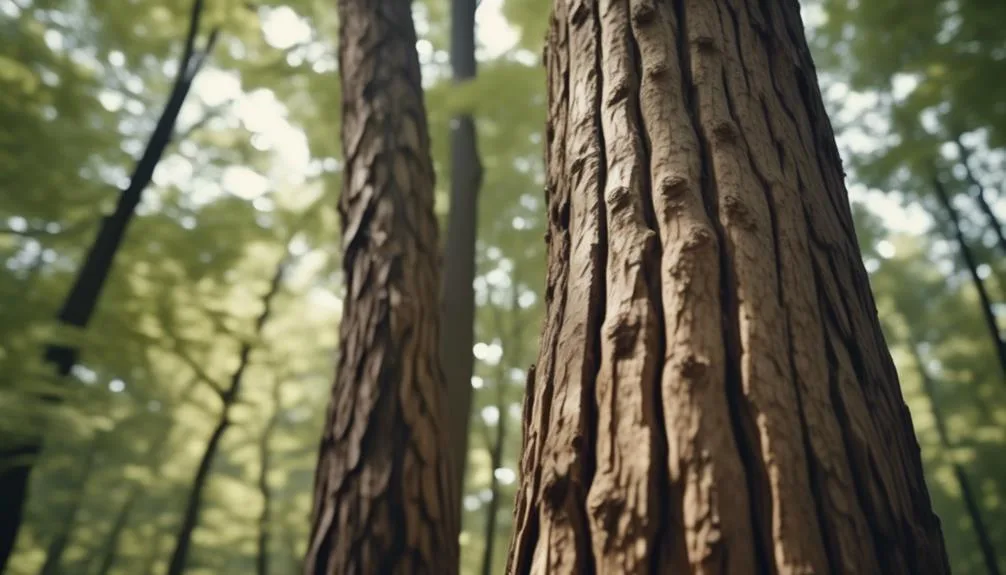Hickory wood is well-known for its strength and durability. The answer lies in the unique cellular structure of the hickory tree. This structure is one of the key factors that make hickory wood exceptionally strong.
There are also other interesting reasons behind its remarkable strength that are worth exploring.
Unique Cell Structure
With its distinctive cell structure, hickory wood offers unparalleled strength and durability, making it a prized material for a wide range of applications.
The cell arrangement in hickory wood consists of long, narrow fibers that are densely packed together, providing exceptional resilience and resistance to wear and tear. This unique cellular composition is the key to hickory's remarkable wood strength, allowing it to withstand heavy loads and intense pressure without easily bending or breaking.
The tightly packed cells also contribute to hickory's impressive shock-absorbing properties, making it an ideal choice for tool handles, sports equipment, and furniture.
The strength and durability of hickory wood, attributed to its specialized cell structure, make it a top choice for demanding applications where reliability is essential.
Dense Wood Fibers
Hickory's unparalleled strength and durability stem from its unique cell structure, which results in dense wood fibers that contribute to its exceptional resilience and ability to withstand heavy loads and intense pressure without easily bending or breaking.
The dense wood fibers in hickory trees play a vital role in their remarkable strength and durability. Here's why they matter:
- Exceptional Load-Bearing Capacity: Hickory's dense wood fibers enable it to bear heavy loads without succumbing to stress.
- Resilience to Pressure: The dense fibers provide hickory with the ability to resist intense pressure, making it a preferred choice for applications requiring robust wood strength.
- Impact on Timber Industry: Hickory's dense wood fibers make it a valuable resource in the timber industry, contributing to the production of high-quality lumber and durable wooden products.
- Longevity and Reliability: These fibers enhance the longevity and reliability of hickory wood products, making them highly sought after in various industries.
- Contribution to Sustainable Practices: The dense wood fibers in hickory trees support sustainable practices in the timber industry by providing long-lasting, sturdy wood for a variety of applications.
High Lignin Content
How does the high lignin content in hickory trees contribute to their unparalleled strength and durability?
The lignin composition in hickory wood plays a significant role in its exceptional strength. Lignin is a complex organic polymer that binds wood fibers together, providing rigidity and resistance to decay.
In hickory trees, the high lignin content results in a dense and sturdy wood structure, contributing to its remarkable strength and durability. This natural adhesive not only reinforces the cell walls but also enhances the overall integrity of the wood, making it highly resistant to bending and compression.
The robust lignin composition in hickory wood ultimately contributes to its reputation as one of the strongest and most resilient woods, sought after for various applications that demand exceptional wood strength and longevity.
Natural Resistance to Decay
The remarkable strength and durability of hickory wood, attributed in part to its high lignin content, also endow it with a natural resistance to decay, making it an ideal choice for long-lasting applications. This natural resistance to decay is a result of the unique chemical composition of hickory wood, which inhibits microbial interactions and prevents the breakdown of the wood.
Here's why hickory wood naturally resists decay:
- High lignin content provides a barrier against microbial attacks.
- Dense wood structure limits the penetration of water and microorganisms.
- Presence of antimicrobial compounds within the wood inhibits decay-causing organisms.
- Natural oils and resins in hickory wood act as a protective barrier.
- Chemical compounds within hickory wood create an inhospitable environment for decay-causing microbes.
Hickory's natural resistance to decay ensures that structures made from this wood remain sturdy and durable for extended periods.
Impact of Growth Conditions
Growth conditions such as soil quality, sunlight exposure, and available water significantly influence the strength and durability of hickory wood. Hickory trees thrive in a range of soil types, but they prefer well-drained, deep soils that are rich in nutrients. The amount of sunlight and water the trees receive also plays a crucial role in determining the wood's strength. Climate variations, including temperature and precipitation, further impact the growth and development of hickory trees, ultimately affecting the quality of the wood they produce. To better illustrate the impact of growth conditions, consider the table below:
| Growth Condition | Impact on Wood Strength |
|---|---|
| Soil Quality | Determines nutrient availability for tree growth |
| Sunlight Exposure | Affects tree growth rate and wood density |
| Water Availability | Influences overall tree health and wood quality |
Understanding these growth conditions can provide insight into why hickory wood is renowned for its strength and durability.
Conclusion
In awe of hickory trees, their robust wood is a testament to their unique cell structure, dense fibers, high lignin content, and natural resistance to decay.
Their resilience makes them a popular choice for crafting tools, furniture, and flooring.
Next time you encounter a hickory tree, take a moment to marvel at its strength and lasting legacy in the world of woodworking.
Mark Hoffman is a dedicated arborist and tree care specialist with over a decade of experience. His love for trees began when he visited Yosemite National Park as a teenager and was awestruck by the giant sequoias. Mark pursued his passion by studying forestry at Michigan Technological University, where he earned a Bachelor of Science degree.
Since then, he has worked tirelessly in the field of arboriculture, helping to preserve and protect trees in his community. His expertise and dedication have made him a respected leader in the industry and a valuable resource for anyone seeking advice on tree care.
